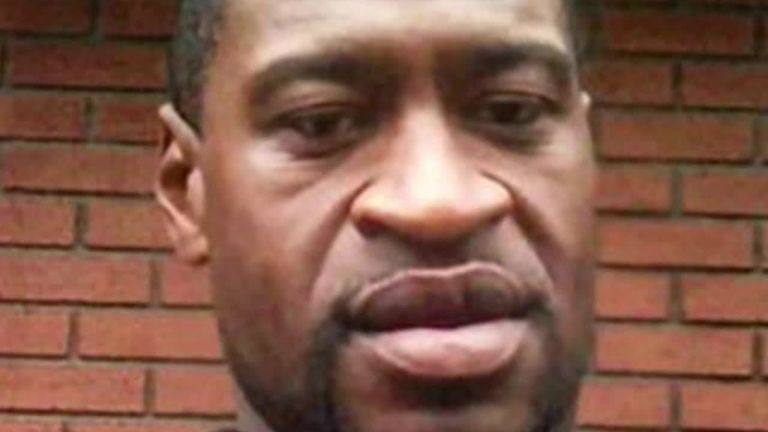George Floyd: Police dispatcher was alarmed watching live video of arrest and called supervisor
The unnamed female dispatcher tells her supervisor she does not care if the call makes her look like a "snitch".
Tuesday 16 June 2020 09:57, UK
A police dispatcher who was watching George Floyd's arrest in real time became so alarmed that she called a supervisor, according to a recording of the call.
The unnamed female dispatcher is heard saying: "I don't know, you can call me a snitch if you want to, but we have the cameras up for [squad] 320's call, and… I don't know if they had to use force or not, but they got something out of the back of the squad, and all of them sat on this man."
She was in a 911 call centre at the time and was watching the video from there, a city spokesperson said.
The dispatcher continued: "So, I don't know if [the squad] needed you or not, but they haven't said anything to me."
"Yeah," the supervisor responded, "they haven't said anything. Unless it's a just takedown which doesn't count, but I'll find out."
The dispatcher then said: "No problem. We don't get to ever see it. So when we see it, we're just like 'Whoa, uh, well.'
"It's a little different. Ok thank you."
The police department's use of force policy states that supervisors must be notified if police officers use force that involves an injury or alleged injury - unless the use of force is a take-down technique.
According to the policy, the officer must stay at the scene and tell a supervisor about the force that was used so that a review can be conducted.
The recording was released by Minneapolis officials as protests continue over the killing of George Floyd on 25 May.
Mr Floyd, an unarmed black man, was pinned down by police officers for nearly nine minutes, despite saying he couldn't breathe.
The city has also released transcripts of two 911 calls from people who witnessed Mr Floyd's death.
:: Listen to Divided States on , , , and
One caller said: "Hello, I am on the block of 38th and Chicago and I literally watched police officers not take a pulse and not do anything to save a man, and I am a first responder myself.
"I just happened to be on a walk so, this dude, this, they fg killed him."
The other caller said an officer "pretty much just killed this guy that wasn't resisting arrest. He had his knee on the dude's neck the whole time."
They added: "I don't even know if he dead for sure but dude was not responsive when the ambulance came and got him, and the officer that was just out here left, the one that actually just murdered the kid in front of everybody."
Former officer Derek Chauvin, who was filmed with his knee on Mr Floyd's neck, has been charged with second-degree murder.
Three other officers who were at the scene have been charged with aiding and abetting second-degree murder and manslaughter.
Second-degree murder is typically defined as murder that is not premeditated and has a punishment that is less severe than that for first-degree murder. It is usually intended to cause only bodily harm and displays an obvious lack of concern for human life.
Audio has also been released of a 911 call made shortly before 27-year-old Rayshard Brooks was killed by police in Atlanta, Georgia on 12 June.
The 911 operator had asked the caller "Is he black?", referring to Mr Brooks, to which the caller replied "He black".
Mr Brooks was shot dead by an officer after he took a Taser, ran a short distance through a car park and pointed it towards the officer.
Race and Revolution: Is Change Going to Come?
On Tuesday night at 8pm, Sky News will broadcast global debate show Race and Revolution: Is Change Going to Come?
It will look at the issues raised by the Black Lives Matter protests, and examine institutional racism and how we fix it.






